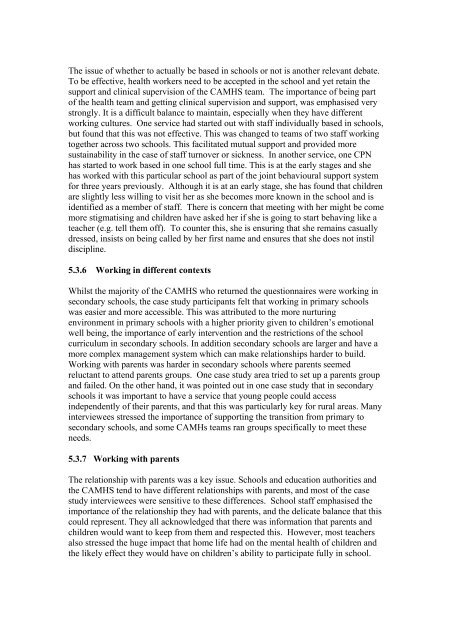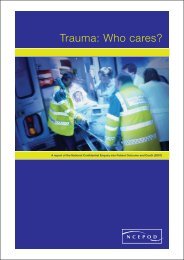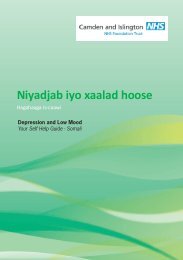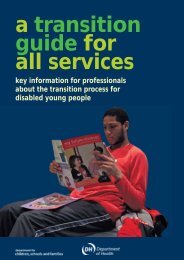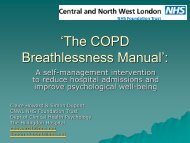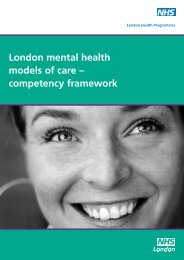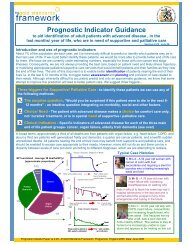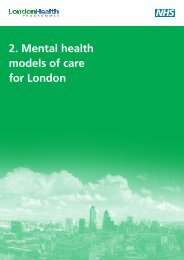(CAMHS) and Schools - London Health Programmes
(CAMHS) and Schools - London Health Programmes
(CAMHS) and Schools - London Health Programmes
You also want an ePaper? Increase the reach of your titles
YUMPU automatically turns print PDFs into web optimized ePapers that Google loves.
The issue of whether to actually be based in schools or not is another relevant debate.<br />
To be effective, health workers need to be accepted in the school <strong>and</strong> yet retain the<br />
support <strong>and</strong> clinical supervision of the <strong>CAMHS</strong> team. The importance of being part<br />
of the health team <strong>and</strong> getting clinical supervision <strong>and</strong> support, was emphasised very<br />
strongly. It is a difficult balance to maintain, especially when they have different<br />
working cultures. One service had started out with staff individually based in schools,<br />
but found that this was not effective. This was changed to teams of two staff working<br />
together across two schools. This facilitated mutual support <strong>and</strong> provided more<br />
sustainability in the case of staff turnover or sickness. In another service, one CPN<br />
has started to work based in one school full time. This is at the early stages <strong>and</strong> she<br />
has worked with this particular school as part of the joint behavioural support system<br />
for three years previously. Although it is at an early stage, she has found that children<br />
are slightly less willing to visit her as she becomes more known in the school <strong>and</strong> is<br />
identified as a member of staff. There is concern that meeting with her might be come<br />
more stigmatising <strong>and</strong> children have asked her if she is going to start behaving like a<br />
teacher (e.g. tell them off). To counter this, she is ensuring that she remains casually<br />
dressed, insists on being called by her first name <strong>and</strong> ensures that she does not instil<br />
discipline.<br />
5.3.6 Working in different contexts<br />
Whilst the majority of the <strong>CAMHS</strong> who returned the questionnaires were working in<br />
secondary schools, the case study participants felt that working in primary schools<br />
was easier <strong>and</strong> more accessible. This was attributed to the more nurturing<br />
environment in primary schools with a higher priority given to children’s emotional<br />
well being, the importance of early intervention <strong>and</strong> the restrictions of the school<br />
curriculum in secondary schools. In addition secondary schools are larger <strong>and</strong> have a<br />
more complex management system which can make relationships harder to build.<br />
Working with parents was harder in secondary schools where parents seemed<br />
reluctant to attend parents groups. One case study area tried to set up a parents group<br />
<strong>and</strong> failed. On the other h<strong>and</strong>, it was pointed out in one case study that in secondary<br />
schools it was important to have a service that young people could access<br />
independently of their parents, <strong>and</strong> that this was particularly key for rural areas. Many<br />
interviewees stressed the importance of supporting the transition from primary to<br />
secondary schools, <strong>and</strong> some CAMHs teams ran groups specifically to meet these<br />
needs.<br />
5.3.7 Working with parents<br />
The relationship with parents was a key issue. <strong>Schools</strong> <strong>and</strong> education authorities <strong>and</strong><br />
the <strong>CAMHS</strong> tend to have different relationships with parents, <strong>and</strong> most of the case<br />
study interviewees were sensitive to these differences. School staff emphasised the<br />
importance of the relationship they had with parents, <strong>and</strong> the delicate balance that this<br />
could represent. They all acknowledged that there was information that parents <strong>and</strong><br />
children would want to keep from them <strong>and</strong> respected this. However, most teachers<br />
also stressed the huge impact that home life had on the mental health of children <strong>and</strong><br />
the likely effect they would have on children’s ability to participate fully in school.


